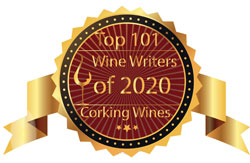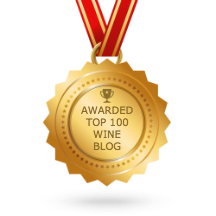white wine review is the latest vintage of an excellent Premier Cru Chablis from Burgundy that arrived at the LCBO a couple of weeks ago in the LCBO VINTAGES New Release Collection.
It is produced by Domaine Yvon & Laurent Vocoret, a small, family-owned winery situated in the Chablis wine region of Burgundy. Originally from the commune of Maligny, in Chablis, the Vocoret family of winemakers is inscribed in the history of vine cultivation and winemaking in the heart of their vineyard since 1713.
The story of the family begins with Jean Vocoret, whose winemaking soul no doubt guided him to pass down his wisdom, his fruits, and the nobility and passion for craftmanship in winemaking to his descendants. Born in 1863, it was Victor Hyppolite Vocoret, the great, great-grandfather of Yvon, who contributed to the renaming of the Domaine when he only had a few acres of vines and small barrels in the cellar.
Born in 1895, it was Yvon's grandparents, Henri and Louise Vocoret, who, despite the suffering during WWI, managed to make the land prosper with the help of their horses, their pride and joy, to produce excellent wine. Next were Maurice and Huguette Vocoret, the parents of Yvon who, hand-in-hand, carefully reflected upon the art of winemaking and invested in high-performing and efficient equipment for the cellar. Maurice and Huguette anticipated that with these improvements, the quality of their wines would gain recognition and respect, and since that time, the Domaine has maintained its reputation for producing high quality wines.
Today, the Domaine is in the hands of Yvon Vocoret and his son, Laurent, the fifth and sixth generations of the family, respectively. Additionally, the spouses Christine (wife of Yvon) and Clémentine (wife of Laurent) are also involved in the family business. Together, they have the same motivation as their ancestors and are grateful and respectful, as they continue to write the story of a humble, but determined, family of winegrowers. By using the same principles as generations that came before them, the Vocoret family produces wines with expertise and passion. With respect for the soil and grapes, the winery works with small volumes, thereby allowing each of their plots to express itself. The current generation of the Vocoret family upholds their family motto of quality, dignity, and respect.
This white wine is crafted with 100% Chardonnay that was grown in Fourchaume, the largest and one of the best known Premier Cru vineyards in Chablis. The vines average 40 years old and are planted on clayey-gravelly soil resulting from Kimmeridgian limestone on marls, along with pebbles of marly limestone with a slightly whitish appearance. With respect for the environment, the family has been farming this vineyard organically since 1974. By 2005 they eliminated the use of anti-botrytis treatments, and by 2009 they stopped using chemical herbicides, and have been practicing sustainable farming for the last 17 years.
To craft this Chardonnay while respecting the character of the vintage, each plot of grapes was harvested at full maturity using both manual and mechanical methods. It was vinified by using the purest and simplest traditions that the family has been applying for five generations. It underwent a very light static settling to retain enough fine lees so that alcoholic and malolactic fermentations can proceed naturally. The wine was aged for 9 months in stainless steel tanks to obtain freshness and character.
In 2023, the season began with a very warm January, followed by average temperatures in February and March, and then a cooler-than-normal April, with enormously varied rainfall amounts during these months. May was also cooler than the long-term average, but warmed up at the end of the month, just in time for flowering and setting the stage for a large crop. June was warmer and drier than usual, while July saw normal rainfall, but was on the cool side, and by early August Chablis was facing drought conditions. August ended with storms and very warm weather, with the warm weather persisting into September and into an early and successful harvest. The extremely good 2023 vintage produced a large crop with wines that are ripe, lush, balanced, and juicy.
After enjoying the excellent 2021 Domaine Yvon & Laurent Vocoret Fourchaume Chablis 1er Cru nearly three years ago, let's see how this 2023 Chablis 1er Cru from Burgundy is tasting tonight...
Crafted with 100% Chardonnay, this has an elegant, medium+ to medium-high intensity nose that feels a bit shy, offering significant flinty and stony mineral aromas layered over rich lemon citrus, golden apple, and pear, plus touches of yellow floral. On the dry, medium-full bodied palate it is richly concentrated and dense with lovely flinty, stony, and saline mineral flavours alongside lemon citrus, golden apple, and pear, plus touches of floral. Exceptionally well-balanced with fine, succulent acidity. Gentle spice notes on the mid-palate, while the stony, flinty, apple, and lemon citrus notes carry through to the exceptionally long finish. Highly recommended buy! Score: 93 pts
Other fine wines by Domaine Yvon & Laurent Vocoret can be purchased through their Agent - DBINO David Beauroy Selections.
It is produced by Domaine Yvon & Laurent Vocoret, a small, family-owned winery situated in the Chablis wine region of Burgundy. Originally from the commune of Maligny, in Chablis, the Vocoret family of winemakers is inscribed in the history of vine cultivation and winemaking in the heart of their vineyard since 1713.
The story of the family begins with Jean Vocoret, whose winemaking soul no doubt guided him to pass down his wisdom, his fruits, and the nobility and passion for craftmanship in winemaking to his descendants. Born in 1863, it was Victor Hyppolite Vocoret, the great, great-grandfather of Yvon, who contributed to the renaming of the Domaine when he only had a few acres of vines and small barrels in the cellar.
Born in 1895, it was Yvon's grandparents, Henri and Louise Vocoret, who, despite the suffering during WWI, managed to make the land prosper with the help of their horses, their pride and joy, to produce excellent wine. Next were Maurice and Huguette Vocoret, the parents of Yvon who, hand-in-hand, carefully reflected upon the art of winemaking and invested in high-performing and efficient equipment for the cellar. Maurice and Huguette anticipated that with these improvements, the quality of their wines would gain recognition and respect, and since that time, the Domaine has maintained its reputation for producing high quality wines.
Today, the Domaine is in the hands of Yvon Vocoret and his son, Laurent, the fifth and sixth generations of the family, respectively. Additionally, the spouses Christine (wife of Yvon) and Clémentine (wife of Laurent) are also involved in the family business. Together, they have the same motivation as their ancestors and are grateful and respectful, as they continue to write the story of a humble, but determined, family of winegrowers. By using the same principles as generations that came before them, the Vocoret family produces wines with expertise and passion. With respect for the soil and grapes, the winery works with small volumes, thereby allowing each of their plots to express itself. The current generation of the Vocoret family upholds their family motto of quality, dignity, and respect.
This white wine is crafted with 100% Chardonnay that was grown in Fourchaume, the largest and one of the best known Premier Cru vineyards in Chablis. The vines average 40 years old and are planted on clayey-gravelly soil resulting from Kimmeridgian limestone on marls, along with pebbles of marly limestone with a slightly whitish appearance. With respect for the environment, the family has been farming this vineyard organically since 1974. By 2005 they eliminated the use of anti-botrytis treatments, and by 2009 they stopped using chemical herbicides, and have been practicing sustainable farming for the last 17 years.
To craft this Chardonnay while respecting the character of the vintage, each plot of grapes was harvested at full maturity using both manual and mechanical methods. It was vinified by using the purest and simplest traditions that the family has been applying for five generations. It underwent a very light static settling to retain enough fine lees so that alcoholic and malolactic fermentations can proceed naturally. The wine was aged for 9 months in stainless steel tanks to obtain freshness and character.
In 2023, the season began with a very warm January, followed by average temperatures in February and March, and then a cooler-than-normal April, with enormously varied rainfall amounts during these months. May was also cooler than the long-term average, but warmed up at the end of the month, just in time for flowering and setting the stage for a large crop. June was warmer and drier than usual, while July saw normal rainfall, but was on the cool side, and by early August Chablis was facing drought conditions. August ended with storms and very warm weather, with the warm weather persisting into September and into an early and successful harvest. The extremely good 2023 vintage produced a large crop with wines that are ripe, lush, balanced, and juicy.
After enjoying the excellent 2021 Domaine Yvon & Laurent Vocoret Fourchaume Chablis 1er Cru nearly three years ago, let's see how this 2023 Chablis 1er Cru from Burgundy is tasting tonight...
Tasting Note:
DOMAINE YVON & LAURENT VOCORET FOURCHAUME CHABLIS 1ER CRU 2023 - AOC, Burgundy, France (#22776) (XD) - $58.95Crafted with 100% Chardonnay, this has an elegant, medium+ to medium-high intensity nose that feels a bit shy, offering significant flinty and stony mineral aromas layered over rich lemon citrus, golden apple, and pear, plus touches of yellow floral. On the dry, medium-full bodied palate it is richly concentrated and dense with lovely flinty, stony, and saline mineral flavours alongside lemon citrus, golden apple, and pear, plus touches of floral. Exceptionally well-balanced with fine, succulent acidity. Gentle spice notes on the mid-palate, while the stony, flinty, apple, and lemon citrus notes carry through to the exceptionally long finish. Highly recommended buy! Score: 93 pts
Other fine wines by Domaine Yvon & Laurent Vocoret can be purchased through their Agent - DBINO David Beauroy Selections.


























